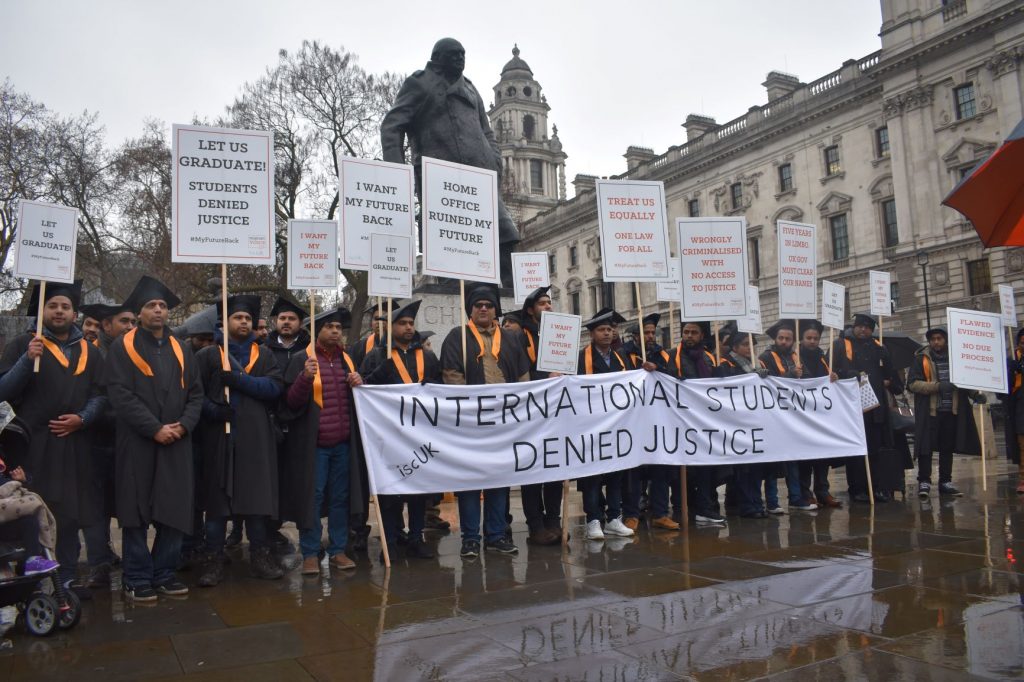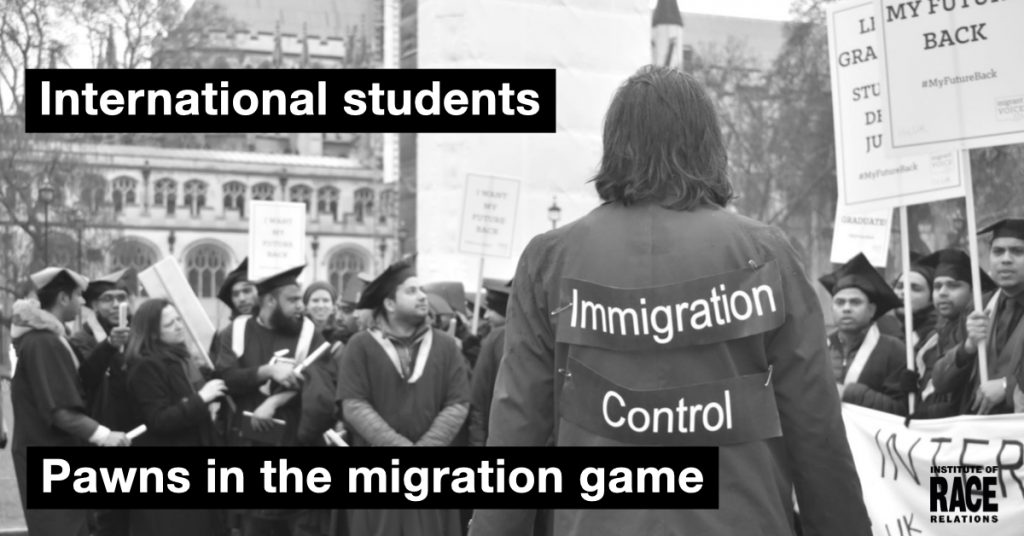While plans to restrict the entry of international students and their dependants appear to be another gesture to appease the Right, their treatment as a rightless cohort has a longer history.
Nepali student Sulav Khadka was interrogated and detained on arrival in the UK to take up his scholarship at York university in October. He was held for 12 days in total, ten of them after his university confirmed his place and his payment of course fees, so that by the time he was released and ready to enrol, he was told it was too late for this year; he would have to return next year. He is now in limbo and in thousands of pounds of debt, borrowed to pay his fare and relocation costs. Khadka’s story reveals the human cost of ‘crackdowns’ such as that reportedly being considered by prime minister Rishi Sunak to deal with unacceptably high international student figures.
The annoucement looks like a knee-jerk response to high net migration figures reported by the Office for National Statistics, which found that in the year to June 2022, net migration to the UK was 504,000. Analysis by the Migration Observatory in Oxford showed that the high net migration figure was due to a combination of unique factors: the humanitarian response to Ukrainian and Hong Kong refugees, which accounted for nearly half the non-EU visas granted in the period, and a post-Covid bounce in international student numbers to 277,000. It warned that the figures did not represent ‘normal’ migration and should not be used as a basis for policy changes – a warning seemingly ignored by the prime minister.
The proposals reportedly being discussed include:
- restrictions on two-year post-study work visas, introduced to enable graduates to seek and take employment in the UK;
- restrictions on students coming to all but the top universities;
- restrictions on the entry of family members.
Judging by the prime minister’s and home secretary’s recent comments, it appears that not all foreign students are being targeted, but those bringing family members and studying so-called ‘low-quality’ degrees – or, as home secretary Suella Braverman put it at the Conservative party conference in October, ‘bringing in family members who can piggy-back onto their student visas’ and ‘propping up, frankly, substandard courses in inadequate institutions’. Decoding this, it clearly excludes students of law or PPE at Oxford or UCL. But one analysis of Office for Students data on courses, institutions and performance shows that what might be described as ‘substandard courses’ or ‘inadequate institutions’ tend not to be places that recruit a lot of international students.
The proposed restriction on the entry of family members appears to be aimed at the Right’s favourite bogeyman: Nigerians. The Daily Mail shrieked, ‘Nigerians accounted for 40 percent of all dependants who accompanied foreign students in the 12 months to June – despite Nigerian students making up just 7 percent of all foreign students in that period, according to Home Office figures. The Mail featured a table showing that over 100,000 Chinese students brought in only 400 dependants, and 93,000 Indian students brought 25,000 dependants, while 34,000 Nigerians brought in around 31,000 dependants – almost one each! Presumably we are supposed to be shocked by this profligacy.
Politics vs education
However, even on the Mail’s logic, It’s hard to see what the problem is with students bringing family members with them. Postgraduate students’ dependants (they are the only dependants now permitted) must be self-supporting – these visas are conditional on ‘no recourse to public funds’, and spouses’ jobs are hardly taking ‘British jobs from British workers’ at a time when the CBI is crying out for looser immigration rules to fill acute labour shortages in most sectors.
The announcement has opened up the perennial rift between those who see international students as an important source of revenue for universities and colleges, with their fees frequently subsidising the institutions’ research and teaching of home students, and supporting small colleges around the country – and those driven by the hard-right demand to cut migration at all costs. The chair of the government’s Migration Advisory Committee, Professor Brian Bell, told Radio 4’s Today programme that cutting foreign students could bankrupt universities and harm the economy. ‘If you’re interested in the levelling-up agenda, you might want to worry about harming universities around Britain’, he added, referring particularly to universities in the north. As he pointed out, slashing international student numbers could also mean home students’ fees going up dramatically – ‘It’s not just an immigration issue, it’s also an education issue’.
Chris Skidmore is one of three Conservative former universities ministers to deprecate the plans to restrict post-study work visas as a ‘catastrophic mistake’: ‘We cannot afford … to shut down a major pathway for regional and economic growth’, he told the Times Higher Education. The director of the Higher Education Policy Institute, Nick Hillman, went further in an op-ed for the THE, arguing that the proposed restrictions were ‘totally counter-productive’, and that it was time to remove the Home Office stranglehold over international student policy. Because of the impact on universities’ finance, the economy and the UK’s global ‘soft power’, he said, policy-making in the area should involve the Department for Education, the Department for International Trade and the Treasury.
Déjà vu
As Nick Hillman says, as the Home Office ‘often seems to see its primary job as keeping foreigners out of the country’, it ‘tend[s] to go after students because it can often seem the easiest way to keep the numbers down’. But – as in the field of migration for work – there is a constant tension between the right-wing imperative of restriction and the economic benefits foreign students bring, in terms of fee income, and skills brought to the labour market (not to mention the educational, social and cultural benefits). This tension has resulted in frequent changes to rules and conditions of entry, and regular crackdowns in response to headlined allegations of ‘abuse’.
In the early New Labour years, the doors were flung open to international students to make the UK a more attractive destination, to boost the economy and the higher education sector through the fee income gained, to subsidise home students and to retain the valuable skills of those graduating here for the domestic labour market. Visa restrictions were lifted in 2002 to enable foreign students to stay for work after graduation – the origin of the post-study work visa.
Outsourcing control
With New Labour’s expansion of international student numbers came increasing monitoring and control of colleges, with many removed from the register of accredited providers, causing huge hardship to students forced to find new colleges or leave the country. By February 2010, 200 colleges had been closed. In 2009 the whole system changed, with education providers required to get a sponsorship licence to enrol international students. This required proof of ability and willingness to participate in immigration control functions, reporting unauthorised absences to the Home Office – leading academics to complain of ‘police-like surveillance’ incompatible with their educational role. In early 2010, the Home Office banned all student applications from Bangladesh, Nepal and north India, in response to a reported ‘surge’ in student applications from these countries, which it claimed was evidence of ‘illegal migration and a backdoor to low-skilled economic migration’, [1] although the ban was lifted a month later. New Labour also significantly increased the standard of English required for students to come to the UK, including for English language courses, forcing the closure of many language colleges; halved the number of hours non-degree level students could work, from 20 to 10 hours per week; and removed or restricted the rights of short-term and non-degree level students to bring dependants.
The coalition and Conservative governments were tougher still. From 2012, universities and colleges had to become ‘highly trusted sponsors’ to be licensed to enrol international students, and in that year London Metropolitan University became the first university to have its licence revoked, leaving its 2,000 international students in limbo, as it ‘could not be trusted to help stop illegal immigration’. (It got it back the following year.) Also in 2012, the standard of English required for students to come in was again raised and the post-study work visa was withdrawn, as part of then home secretary Theresa May’s drive to ‘cut migration to the tens of thousands’. (The post-study work visa was reinstated in 2019, in the drive to attract skills to post-Brexit Britain.) In addition, the maximum duration of student visas was reduced, rights to work were restricted to students at universities and publicly funded further education colleges, and the right to bring family members was restricted to government-sponsored and postgraduate university students.
The ‘test cheats’ scandal
The most infamous crackdown on students came when, in June 2014, immigration minister James Brokenshire told Parliament that up to 48,000 ‘bogus’ students had falsified English language tests. The allegation came after a BBC Panorama programme, screened in February 2014, claimed to find systemic fraud among students taking tests set by ETS, one of the largest English-language testing firms in the world, with candidates being replaced by fake ‘sitters’. On the basis of a flawed investigation by ETS, which claimed that 97 percent of tests were invalid, the Home Office treated all the students in the cohort as cheats and told them to leave the UK, as well as revoking the licences of nearly 100 colleges. Thousands subsequently won appeals as the opaque and unreliable nature of the investigation emerged and it became clear that a large number of students were innocent of wrongdoing. In 2019, a National Audit Office investigation reported that, while cheating had occurred on a large scale, the Home Office was indifferent to the risk of innocent students being caught up in the dragnet and had failed to protect wrongly accused students, many of whom are still fighting to clear their names.

The Home Office remains unapologetic over its treatment of all students who took the test as guilty, refusing to acknowledge the human consequences of its actions. Such indifference is the hallmark of the department. It is also at the heart of the treatment of international students, particularly those from the Global South, as a rightless cohort, that can be accepted or rejected at will, and a migration policy which is dictated by perceived short-term party-political demands.

